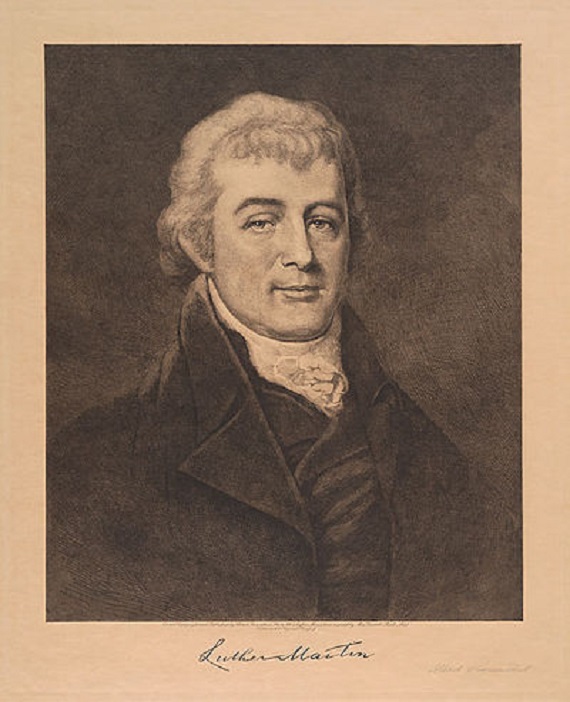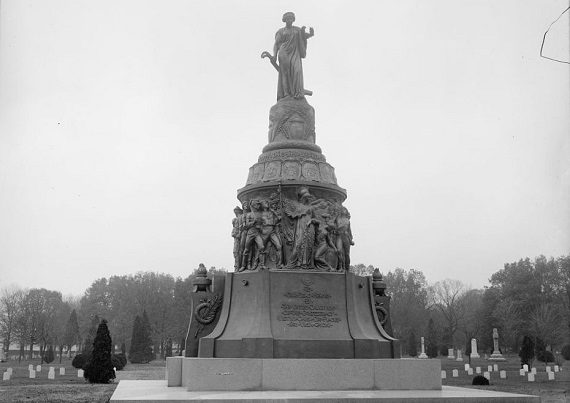As a delegate to the Constitutional Convention and as an eminent lawyer and statesman, Martin defended state sovereignty and the diffusion of political authority. He is usually identified as an Antifederalist. Martin was responsible for proposing several key components of the new government at the Convention, including the Electoral College, as well as earning a lasting reputation as a trial attorney arguing cases before the Supreme Court.
Born in New Jersey, the son of Benjamin and Hannah Luther, who were farmers and evangelical Protestants. Although the family was of modest means, they were able to send the Martin to the College of New Jersey (Princeton University), and he graduated with honors in 1766. Martin spent several years teaching before presenting himself to be examined for admission to the Virginia bar. Luther passed the licensing examination, traveled to the western regions of Virginia, Maryland, and Pennsylvania, before starting a law practice on Maryland’s Eastern Shore.
By 1774 Martin had become associated with efforts to declare independence. He was elected to the Committee of Observation in Somerset County and as a delegate to the Provincial Congress in Annapolis. Martin, who had attracted the attention of the revolutionary leaders in Maryland, was also appointed as attorney general of the state in 1778, a post he would hold for twenty-seven years. He briefly fought in the Revolutionary War and continued to practice law. Martin was elected to the Confederation Congress in 1784, but his official responsibilities prevented him from attending. When the Maryland legislature selected delegates to the Constitutional Convention, Martin was elected and accepted the appointment. As Founder, Martin participated in the Convention from June 9, 1787 until September 4, departing from the gathering in protest with his fellow Maryland Antifederalist, John Francis Mercer. It is generally assumed that Martin was one of the authors of the New Jersey Plan that strengthened the authority of Congress, while maintaining the system of representation contained in the Articles of Confederation. Martin’s criticism of the Constitution and his participation in the Convention is frequently misunderstood. He believed that the Articles needed reform and was much more than a thwarter of change. According to Martin, the federal government’s purpose was to protect the states. Moreover, Martin contributed substantially to the development of the constitutional order that would emerge from the Convention, including the introduction of the electoral college. He explained his concerns about the Constitution to the Maryland delegation and to George Washington before departing from Philadelphia.
In 1788 Martin presented his objections to the Maryland legislature and published his comments as The Genuine Information. He supported inclusion of a bill of rights to protect the states and their citizens from the federal government. Elected as a delegate to the Maryland ratification convention in April 1788, Martin was unable to participate in debate as the result of laryngitis.
After the adoption of the Bill of Rights in 1791, especially the Ninth and Tenth Amendments, Martin was more favorable towards the Constitution. As the result of his disdain for Jefferson, Martin became more sympathetic to the Federalist cause and was an outspoken critic of the Jefferson presidency. His successful handling of the defense of associate justice Samuel Chase’s impeachment trial in the Senate (1805), and Aaron Burr’s treason trial (1807) won Martin great respect and fame. Martin argued several cases before the Supreme Court, including McCulloch v. Maryland (1819). In McCulloch, Martin warned against the abuses of implied powers and suggested that a state could tax a federal bank. He lost the case, but defended what he believed was a central feature of the Constitution. In August 1819 Martin suffered a paralyzing stroke that prevented him from speaking. He would live for seven more years, spending his final days in the home of Aaron Burr.







